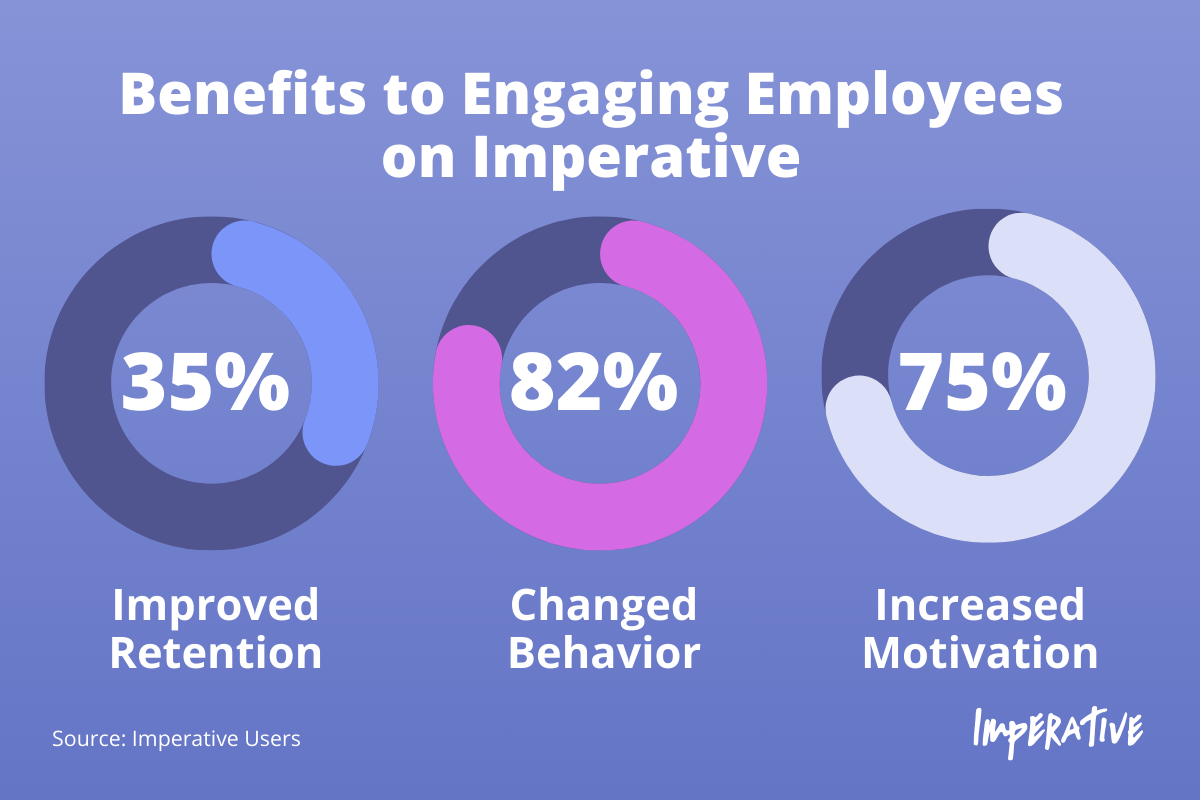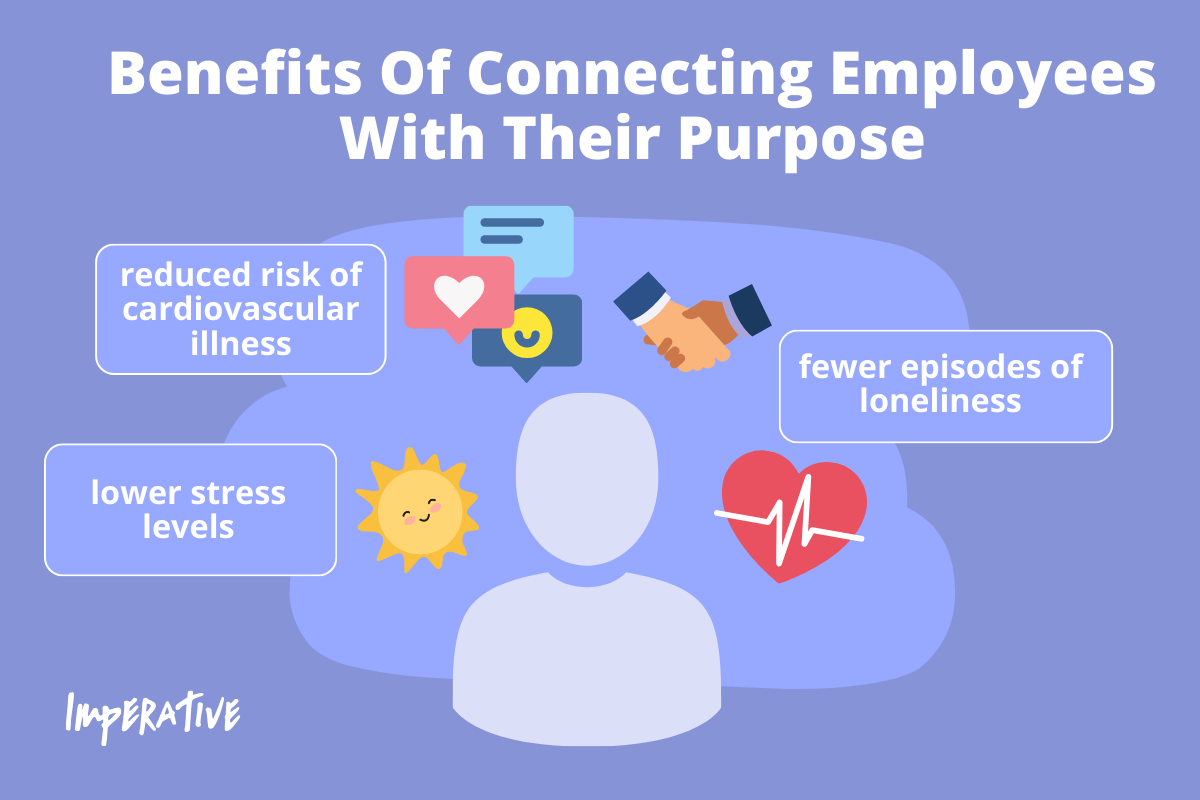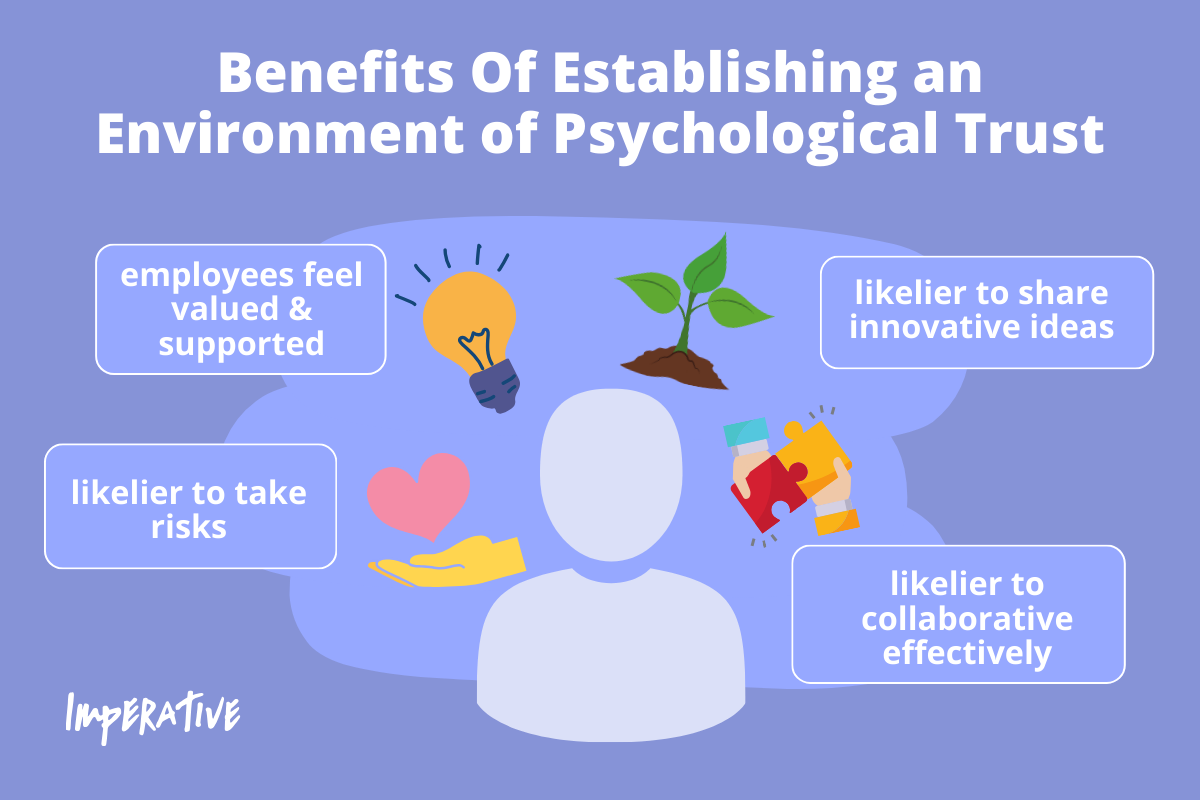Our Story:
How Imperative Uses Neuroscience To Transform Workplaces
What This Article Covers:
Positive employee engagement impacts every area of your business, from customer experience and employee retention to profitability and innovation. So, it’s always frustrating to feel that your employees are in a slump and aren’t as engaged as they could be.
Gallup’s State of the Global Workplace report reveals that only 23% of the world’s population feel actively engaged in their roles. Depressing as this statistic may sound, disengagement isn’t a permanent state. It can be changed when you activate your people at scale by engaging them in the art of meaningful conversation. Imperative’s platform uses guided conversations to get your employees talking to each other, uncover their purpose, and connect the dots between their intrinsic motivators and their work.
It’s a scientific approach that yields excellent results. For example, our customers experience the following benefits when their employees lean in and start talking to each other:
- 35% improved retention
- 82% changed behavior
- 75% increased motivation
This article unravels the neuroscience behind Imperative and how our platform uses psychology to produce phenomenal results for your organization.

Imperative’s Neuroscientific Foundation
Award-winning social entrepreneur, Aaron Hurst, also the best-selling author of The Purpose Economy, developed Imperative in 2013 as the first employee purpose profiling technology. He designed our platform to help people discover and own their purpose at work by understanding their personal strengths and motivators. In 2020, he relaunched Imperative as a guided conversation platform in response to the rising hybrid movement.
Our technology accelerates meaningful connections and builds trust across entire organizations, regardless of where your team is based. 100k conversations later, Imperative has radically increased engagement in top companies like Zillow, Microsoft, GSK, Boston Scientific, Hasbro, and many more.
Wondering how? There’s no secret ingredient. Imperative’s effectiveness is the result of pure psychology, with the following neuroscientific principles underpinning every conversation hosted on our platform.
Using Positive Psychology To Develop Meaningful Connections
Humans are profoundly shaped by our environments and those around us. Our need for social connection can be traced back to our evolutionary history, where social bonds and group cohesion played crucial roles in survival and reproduction. Early humans faced numerous threats, including predators, environmental hazards, and resource scarcity, but living in cohesive groups provided safety and protection. By banding together, individuals could defend against predators more effectively, share resources, and help one another during times of danger or scarcity.
In the modern workplace, our instinct to bond with others still exists. And when we deepen our connections at work, we’re more engaged, collaborative, accountable, and innovative. In her Broaden and Build Theory, Dr. Barbara Fredrickson suggests that the impact of this positive psychology accumulates and compounds over time, especially as we build more and more meaningful connections. When Gallup interviewed Fredrickson, they asked her how managers can use positive psychology to increase workplace engagement. She answered,
“One place to start would be finding ways to connect people that would generate more positive emotions in your workgroup. Allow people to connect with others on a human level at work so that when they’re coming to work, they’re coming to a place they want to be, somewhere they feel recognized. And really look at the emotions they’re expressing and use that as your proximal indicator.
When we are given permission to focus on emotions, a new dimension of the human landscape just pops out. If you pay attention to and track emotions, especially positive emotions, I think that you capture a lot more information that will help you make decisions.”
Know that fostering these meaningful connections doesn’t happen overnight. A study published in the Journal of Social and Personal Relationships found that it takes 50 hours together to elevate someone from being an acquaintance to a casual friend, 90 hours to become a solid “friend,” and 200+ hours to develop a close friendship. Start to put in the effort now, and you’ll reap the rewards sooner rather than later.
Imperative’s Approach To Workplace Connections
Imperative sparks sustained and intentional connections by smart matching employees with the right colleagues to enjoy a conversation together. The guided structure of our platform accelerates trust and builds rapport as your people start to share their experiences and challenges. Remember this isn’t just happening between two people; our scaled approach allows for tens, hundreds, or thousands of conversations to occur, quickly building interconnectedness throughout your teams and your entire organization.
Unlocking The Power Of Purpose At Work
Historically, work was about strength, stamina, and having the physical attributes to get through the workday. But, as our workplaces have developed and machines have replaced physical labor, modern employees increasingly lean on their cognitive skills. And this shift has required a new approach to motivation.
Extrinsic motivators like pay raises or promotions were previously enough to keep employees engaged and productive. But as technology advances and we move into a knowledge-based economy, these external rewards have become less effective in motivating employees in the long-term. Instead, research shows that intrinsic motivators like having a sense of purpose and personal fulfillment are crucial in driving employee engagement and performance.
Imperative’s co-founder Aaron Hurst defines purpose as “the overlap of seeing the impact of your work on an entity you care about, using your strengths to create that impact, and contributing to something bigger than yourself.”
He believes that no single job or role is purposeful, but an individual employee may feel purpose in it depending on how they connect their day-to-day tasks and responsibilities to a higher cause or mission they believe in. This is evident in Imperative’s first Workplace Purpose Index report, which revealed that many high-impact professionals such as teachers, doctors, or social workers felt unfulfilled in their roles. Conversely, many people in low-impact positions report purpose and fulfillment in what they do.
Part of igniting the power of purpose at work is aligning an individual’s personal drive with the company’s mission. Essentially, employees need to understand how their daily contributions impact the overall organization to experience a sense of purpose. And when they do, they feel energized and enjoy a slew of physical and mental health benefits. Studies find that people with a high sense of purpose have a reduced risk of all-cause mortality and cardiovascular illness, lower stress, and fewer episodes of loneliness.

Imperative’s Approach To Unlocking Purpose At Work
As a purpose-driven platform, the first step when employees register with Imperative is to complete a proprietary purpose assessment to dig into what gets them out of bed in the morning and excited about work. Employees choose their “Imperative,” such as relationships, growth, or personal impact, and answer a series of short questions to unlock their purpose. Using this information, the platform creates a personalized structure for their next guided conversation. It’s an approach that 93% of employees believe has influenced their success.
Developing Positive Habits Through Social Reinforcement
Social reinforcement is the idea that people are more likely to continue their behavior when they receive positive feedback from others. A study on Behavioral and Neural Properties of Social Reinforcement Learning examined how people learn from certain types of interactions with others. Using brain scans to analyze people’s reactions, researchers concluded that participants liked and responded quickly to those who gave more positive feedback. Additionally, the brain areas related to rewards were more active when people expected good feedback from certain coworkers.
Building on this, psychologist B.F. Skinner popularized Operant Conditioning, which demonstrates that when people receive positive social responses from peers, this triggers reinforcement and leads to the strengthening and continuation of that behavior.
Feedback doesn’t have to occur as part of a formal process like a performance appraisal; it can also take place during a simple conversation where participants share stories and experiences with each other. During dialogue, the human brain is wired to become immersed in listening to the details and feeling an array of senses as they engage in the conversation and reflect on their workplace interactions.
Imperative’s Approach To Triggering Positive Social Reinforcement
Imperative is a vehicle for reciprocity, allowing employees to reflect and learn about themselves while getting to know another person. Our guided conversations trigger social reinforcement by prompting employees to share stories about their work and providing positive feedback on those experiences. This leads to a deeper understanding of self and others, strengthens relationships, and creates a more positive work environment.
Establishing An Environment Of Psychological Trust
Psychological trust is the emotional bond between individuals based on their perception of the relationship. When both individuals experience that trust, they feel comfortable sharing their thoughts and ideas without fear of judgment or negative consequences.
In a workplace setting, psychological trust is essential for creating an environment where employees feel valued and supported. They are likelier to take risks, share innovative ideas, and collaborate effectively with their colleagues.
Neuroscientist Paul Zak has extensively researched the role of oxytocin in building psychological trust after learning that rodents used it to show other animals it was safe to approach. In humans, this hormone creates feelings of empathy, bonding, and trust, making it essential for fostering positive relationships in the workplace. In fact, oxytocin is often called the “love hormone” because it is released when people feel safe and connected to others.
When trust is missing, a study on The Toxic Effects of Perceived Social Isolation finds this can be biologically toxic for companies, leading to employees feeling guarded and disengaged, resulting in decreased productivity and creativity. This loneliness heightens sensitivity to social threats and impairs executive functioning, sleep, and both mental and physical wellbeing.

Imperative’s Approach To Boosting Psychological Trust
Imperative’s platform acts as a supportive and safe container where employees have dedicated blocks of time to discuss their “imperative.” The permission to focus on ourselves and our conversation recipient creates a connection that boosts oxytocin levels, and increases feelings of trust and safety. Employees feel comfortable expressing themselves and bringing their whole selves to a psychologically safe workplace.
Driving Action And Accountability
Much like a gym buddy supports you in accomplishing your fitness goals, peers can also promote accountability in a professional setting. At its core, accountability is about being responsible for our actions and decisions. When people take ownership of their commitments, they’re more likely to follow through, meet their goals and drive success. This is where social reinforcement comes into play again—when peers support and encourage each other in their pursuits, it leads to a greater sense of accountability.
Accountability can also involve admitting our weaknesses and discussing challenges we’ve faced in the workplace. But when unraveling the psychology of accountability, it’s important to recognize that it differs wildly from shame. While shame is a highly destructive emotion that can lead to negative outcomes, accountability promotes personal growth and improvement.
Even better, it can drive real action across your entire organization. Joseph Grenny, the best-selling author of Crucial Conversations, discusses the importance of universal accountability in an HBR article. This principle ensures that peers can hold anyone accountable if it’s in the team’s best interests. The result is that team members feel more motivated and able to express everyday concerns with each other.
Imperative’s Approach To Ownership And Accountability
Imperative uses positive reinforcement and peer support to create a workplace accountability culture. By facilitating guided conversations between employees, Imperative encourages everyone to set personal goals for themselves and hold each other accountable for achieving them. This creates a sense of shared responsibility and fosters a culture of continuous growth and improvement.
Maximize Behavioral Science With Imperative
At Imperative, we leverage the power of behavioral science to transform workplaces, fostering environments of trust, accountability, and continuous growth. Our platform facilitates meaningful connections to shape resilient, innovative, and highly-engaged organizations.
Every journey towards improving employee engagement begins with a single step, and you can take yours today. Book an Imperative demo now and experience the power of neuroscience in the workplace.
